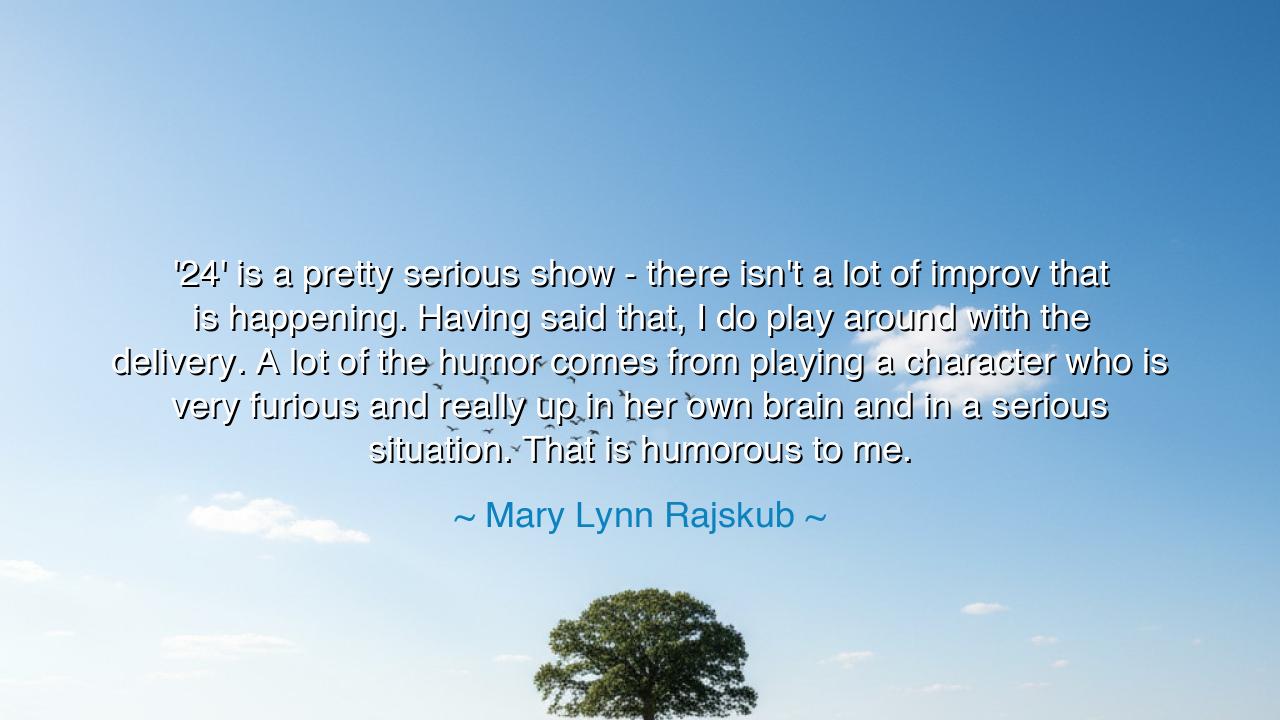
'24' is a pretty serious show - there isn't a lot of improv that
'24' is a pretty serious show - there isn't a lot of improv that is happening. Having said that, I do play around with the delivery. A lot of the humor comes from playing a character who is very furious and really up in her own brain and in a serious situation. That is humorous to me.






When Mary Lynn Rajskub said, “‘24’ is a pretty serious show — there isn’t a lot of improv that is happening. Having said that, I do play around with the delivery. A lot of the humor comes from playing a character who is very furious and really up in her own brain and in a serious situation. That is humorous to me,” she offered not just an insight into her craft, but into the deeper nature of human existence. Her words speak of the paradox of humor within seriousness, of finding levity not by escaping intensity, but by leaning into it. Beneath the actor’s reflection lies a timeless truth: that even in the midst of struggle and tension, the spirit can find laughter—not in denial of pain, but in mastery of it.
The origin of this quote rests in Rajskub’s portrayal of Chloe O’Brian on the acclaimed television series 24, a drama famed for its relentless pace, moral gravity, and high-stakes urgency. The world of 24 was one of ticking clocks, terror threats, and emotional turmoil. Within that storm, Rajskub’s character stood as a peculiar kind of light—serious, awkward, perpetually frustrated, yet unintentionally funny. Her humor did not come from telling jokes or seeking laughter; it came from truth, from the rawness of her reactions, from the honesty of tension itself. This is the lesson of her words: that the deepest humor does not emerge from contrivance, but from authenticity.
When she says, “I play around with the delivery,” she is describing an artist’s sacred rebellion. Even within the structure of a script, she finds space to breathe life, spontaneity, and play. This mirrors the way the wise live within the constraints of the world. Life, like a drama, gives us fixed circumstances—roles, duties, limitations—but within them, there remains room for grace, for wit, for creativity. The soul that can “play with the delivery” of its fate, that can infuse a serious life with humor and humanity, discovers a freedom that no system can cage. Rajskub’s humor, therefore, is not an act of defiance, but of liberation—a reminder that even in the rigid moments of life, we remain creators.
Her reflection also reveals something profound about perception: that humor often hides in the serious, just as light hides within shadow. When Rajskub says that she finds humor in “a character who is furious and really up in her own brain,” she is naming a universal truth about human folly. The more consumed we become by control, by anxiety, by self-importance, the more absurd our struggles appear to an outside eye. The ancients understood this well. The philosophers of Greece often spoke of comedy as the mirror of man’s pretension—for laughter is born when we recognize the gap between who we think we are and what we truly are. Thus, to laugh at seriousness is to achieve wisdom; it is to see through illusion without bitterness.
Consider the story of Charlie Chaplin, who mastered the art of finding humor in despair. In the silent film Modern Times, he played a factory worker caught in the cogs of an industrial machine. His movements were frantic, mechanical, almost tragic—and yet, profoundly funny. The audience laughed, not because his suffering was small, but because his resilience was great. Like Rajskub’s character, Chaplin’s comedy was born from tension, from the courage to embrace the absurdity of serious situations. Through laughter, he transformed struggle into art. His humor, like Rajskub’s, became a testament to the strength of the human spirit: the power to smile even while standing in the storm.
Rajskub’s words, though about acting, hold deep philosophical meaning for every soul that seeks to live well. Life is a “serious show.” There is no shortage of deadlines, crises, and expectations that pull us into perpetual seriousness. Yet, as she suggests, even within such gravity, there is room to “play with delivery”—to find the rhythm of joy amid the structure of struggle. The wise learn to laugh at their own intensity, to see the humor in their own overthinking. For in that laughter lies detachment, and in detachment lies peace. To laugh sincerely at oneself is to be free.
Thus, my children of the mind and the heart, let this be your lesson: find humor within your seriousness. When life grows heavy, do not flee from it—stand within it and look for the glimmer of irony that redeems it. When your thoughts grow furious and tangled, remember that laughter can untie knots that logic cannot. Allow yourself, as Rajskub does, to “play with delivery,” to bring lightness even to the roles you did not choose. In every burden, there is a smile waiting to be born; in every chaos, a rhythm waiting to be found.
And finally, remember this: humor is not the enemy of depth—it is its companion. It is the soul’s way of keeping perspective, of breathing through the tension of living. As Mary Lynn Rajskub teaches, the greatest laughter often springs from the gravest places, for that laughter is pure—it is survival, it is grace. So live your life as both actor and poet: embrace its seriousness, but never forget to laugh at your own script. In that laughter, you will find not escape, but wisdom—the eternal wisdom that even in the drama of life, joy remains undefeated.






AAdministratorAdministrator
Welcome, honored guests. Please leave a comment, we will respond soon